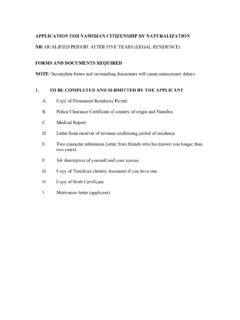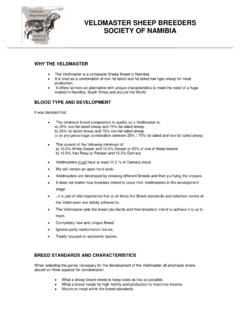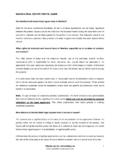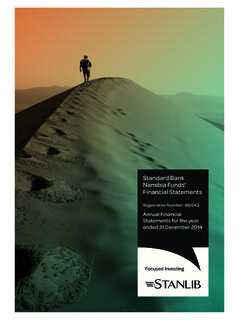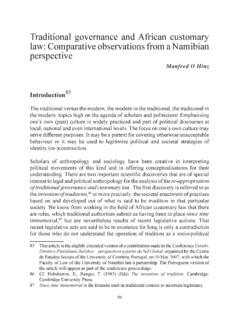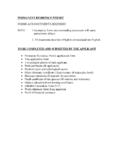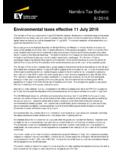Transcription of HOW TO REGISTER A BUSINESS IN NAMIBIA
1 HOW TO REGISTER A BUSINESS IN NAMIBIA Companies and Patents Registration Office A Directorate of the Ministry of Trade and Industry FOREWORD This booklet explores the ways how the choice of BUSINESS entity may be important to you as a BUSINESS person. This guide is designed to be your introduction to companies and close corporation registration procedures and requirements. The mission of the division of the Registration of Companies and Close Corporation in the Ministry of Trade and Industry is to manage, regulate and facilitate the formation of BUSINESS entities and to encourage investment through an appropriate legal framework and conducive environment that ensures the flourishing of businesses. One of the most important decision to be taken by anyone, who wishes to launch a BUSINESS enterprise, is the choice of BUSINESS form.
2 In modern-day NAMIBIA there are various important BUSINESS forms, namely sole proprietorship, partnerships, companies and close corporations. It is not, however, a comprehensive text nor a substitution to the Companies Act and Close Corporation Act. Nor is it a substitute for the professional advice you may need from legal practitioners, auditors, accounting officers or secretarial firms to assist you in the registration of your BUSINESS . An entrepreneur in NAMIBIA can choose from a variety of BUSINESS forms to conduct its BUSINESS . The following is a short description of the different forms available. THE INCORPORATION OF A COMPANY What is the difference between a public and private company? Public: Shares are offered to the public. There is no limitation on maximum shareholders, but there is a minimum of seven subscribers at incorporation of company.
3 There is no limit on the transfer of its shares. The word Limited will appear at the end of the companies name. They must make certain information known to the public. This type of BUSINESS is normally very capital intensive. There is a minimum of two directors. Private: Shares are not offered to the public. There is a maximum of 50 and a minimum of one shareholder. There are some restrictions on the transfer of shares. The words (Proprietary) Limited or (Pty) Ltd will appear at the end of the company s name. Do not have to make information available to the public. There is a minimum of one director. NGO: Section 21 of the Companies Act makes provision for this type of BUSINESS and is regarded as a public company and the same applies as above, except there is no share capital. The advantages of forming a company: A public company can issue shares to the public to raise capital.
4 Shareholders are not liable for the debts of the company, often negated when shareholders are required to offer personal guarantees. As in the case of the close corporation, the company has perpetual succession (indefinite life-span), which means the BUSINESS can continue even if the members die. Forming a company: It is recommended that due to the relative complexity in the compilation of the memorandum and articles of a company and the fact that these documents to a greater extent have to be adjusted to fit the specific circumstances and needs of each individual company, it is suggested that the services of a legal practitioner be used in this regard. The memorandum and articles also have to be certified by a notary public who in any event will have to be a member of the legal profession. The legal aspects of the company are regulated by the Companies Act 61 of 1973.
5 Please note that all documents must be completed in black ink. The memorandum and articles of association: The memorandum and articles of association have to be registered at the Registrar of Companies and Close Corporations. The forms are obtainable at any stationer dealing with statutory documents. Most attorneys and auditors have these forms on computer. Submit more than one name in order of preference to the Registrar, a Revenue stamp of N$ is required and is obtainable at any post office. This is to reserve the name you would like to REGISTER your company under and is completed on form (CM5). The amount of initial registered share capital. Par value shares ( one hundred shares at N$ each) or no par value shares ( one hundred shares). This is submitted to the Registrar on the CM2.
6 Any legal company powers you would like to exclude or qualify. Mention any contract entered into by the members before registration of the company. Any special conditions. An association clause stating that you wish to form a company and how many shares they agree to own. The articles of association deal with the internal management of the company. Schedule 1 of the Companies Act has a model, which you could follow. (Similar to the CCs association agreement). Other documents: Every other name of the company (translated or shortened form) should first be reserved separately on CM5 with a N$ revenue stamp for each name. CM7 Approved translated version of name or abbreviated form is submitted to the registrar with a N$ revenue stamp. CM22 Physical and postal address of the company is submitted to the registrar with a revenue stamp of N$ The auditor needs to complete a CM31, which contains all his details and serves as his consent to act for the company.
7 This is submitted to the registrar with a N$2,00 revenue stamp. Evidence that the necessary fees have been paid, a fee of N$5,00 for each N$1000 or part thereof of authorized share capital which is submitted on CM2. Annual duty is payable on a form CM23 a minimum amount of N$80,00 depending on your issued capital. The articles of association deal with the internal management of the company. Schedule I of the Companies Act has a model, which you could follow. (Similar to the CCs association agreement). NB. Upon conversion of a close corporation into a company, a form CM5 will only be necessary if the name changes, otherwise no reservation of name is required. Statements in terms of section 29C (4) (a) (i) and (ii) of the Companies Act have to accompany all documents as listed above in the case of conversion. When can a company start doing BUSINESS ?
8 After the following have been completed (and you have received your certificate to start the BUSINESS ): Particulars of directors and officers of the company are completed on form CM29 and are kept at the company s registered office for inspection. Form CM29 must be completed and submitted within 14 days of any change of appointment. DOCUMENTS REQUIRED FOR THE INCORPORATION OF A COMPANY DOCUMENT PURPOSE FEES CM5 (in duplicate) Application for reservation of name Original stamped N$5,00 Power of Attorney Authorization to act on behalf of promoters To be stamped N$5,00 per person CM22 (in duplicate) Notification of situation of registered and postal address Original stamped N$2,00 CM29 Return containing particulars of directors Original stamped N$2,00 CM1 Certificate of incorporation CM46 Application for certificate to commence BUSINESS .
9 Original stamped N$10,00 plus annual duty CM47 (by each director) Statement by directors regarding adequacy of share capital Original stamped N$2,00 CM31 (in duplicate) Consent to act as auditor Original stamped N$2,00 CATEGORY OF COMPANY DOCUMENTS PURPOSE FEES 1. Company with a share capital CM2, 2A, 2B, 2C or 2D Memorandum of Association N$2,50 per R1 000 of authorized capital in the case of par value shares of N$2,50 per 1000 shares in the case of no par value shares 2. Company without share capital CM44B, 44C Articles of Association 3. Company limited by guarantee, or association incorporated under section 21 CM3, 4, 4A, 4B Certificate of incorporation and Memorandum of Association adopting Table A of B CM44 Articles of Association 5.
10 Company not adopting Table A or B CM44A, 44C Articles of Association The CM29 is part of the documentation necessary to incorporate the company and, only once the CM46 is received can the company start trading. Application for a certificate to start the BUSINESS is completed on form CM46 and is submitted to the registrar with a N$10 revenue stamp, plus annual duty. The director needs to complete written consent on form CM27 and is kept at the registered office of the company. A statement from each director testifying that the capital they have is sufficient to conduct BUSINESS , if not, how they intend financing the company must be completed on form CM47 and is submitted to the Registrar with a revenue stamp of N$2,00. The name of the company must appear on letterheads, invoices, receipts, cheques, notices etc.
